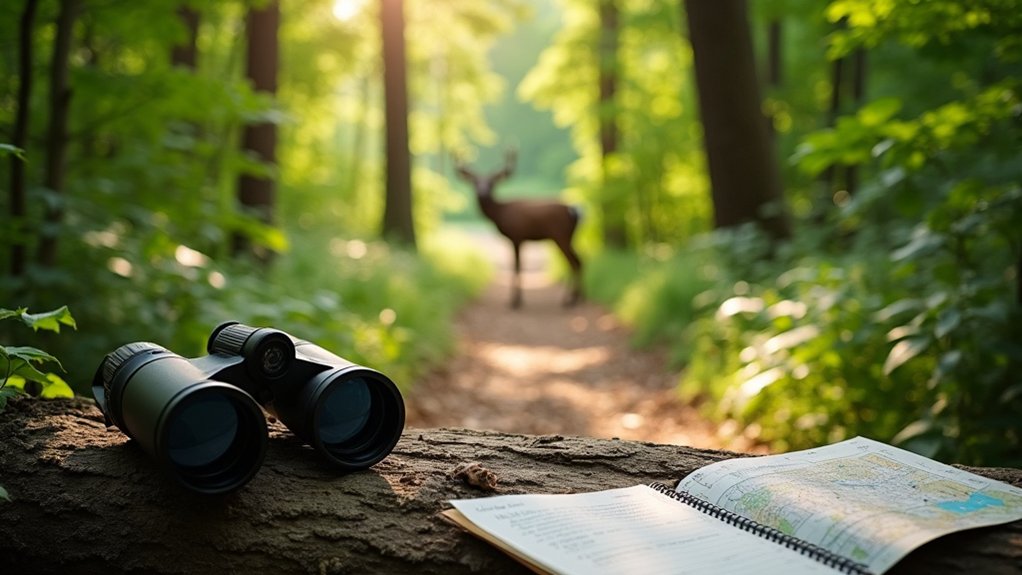When you head out for a hunting trip, it’s vital to know how to avoid violations that could ruin your experience. Staying informed about local regulations and understanding bag limits is key. You might think you’ve got everything covered, but there are often unexpected rules that can trip you up. Let’s explore some essential tips that will help you navigate the complexities of hunting laws and guarantee a smooth outing.
How to avoid hunting violations: Essential tips for all hunters
When it comes to hunting, staying on the right side of the law is essential. To avoid violations, start by familiarizing yourself with local regulations; they can vary widely.
Always carry your hunting license and necessary permits. Make certain your gear meets legal requirements, and never hunt out of season or in restricted areas.
Practice ethical hunting by respecting bag limits and being mindful of protected species. Stay informed about any changes in laws or guidelines.
Finally, report any suspicious activities you witness. By following these essential tips, you’ll keep your hunting experience enjoyable and lawful.
Happy hunting!
What are the most common hunting violations to be aware of?
Understanding the most common hunting violations can help you stay within the law and enjoy your time outdoors.
One frequent issue is hunting without a valid license or permit. Another violation is exceeding bag limits, so always know your quota.
Hunting during closed seasons or using illegal weapons can lead to serious consequences. Additionally, failing to report harvested game or not using proper tagging can raise red flags.
Finally, trespassing on private land without permission is a major offense. Stay informed and check local regulations to avoid these common pitfalls, ensuring a respectful and legal hunting experience.
Why is it important to understand hunting regulations?
Knowing hunting regulations is essential not only for staying within the law but also for preserving the environment and wildlife populations. By understanding these rules, you guarantee that you’re hunting ethically and sustainably, which contributes to healthy ecosystems.
Violating regulations can lead to hefty fines, loss of hunting privileges, and damage to your reputation as a responsible hunter. Additionally, following the laws protects endangered species and maintains balance in nature.
Familiarizing yourself with local regulations helps you make informed decisions, promoting a safer and more enjoyable experience for you and future generations of hunters. Respecting the rules benefits everyone.
How can you stay updated on local hunting laws?
How can you guarantee you’re always informed about local hunting laws? Start by regularly checking your state’s wildlife agency website, as they often post updates and changes.
Sign up for newsletters or alerts to receive information directly in your inbox. Follow local hunting organizations on social media for real-time updates and tips.
Engage with fellow hunters in community forums, where discussions often cover recent law changes. Consider attending local meetings or workshops that focus on hunting regulations.
Finally, always carry a current hunting guide when you head out, ensuring you have the most accurate information at your fingertips.
What are the best practices for ethical hunting?
While hunting can be an exhilarating experience, adhering to ethical practices is essential for both the sport and the environment.
Always respect wildlife by only taking what you need and ensuring a quick, humane kill. Practice fair chase principles, giving animals a fair opportunity to escape.
Educate yourself about the species you hunt, including their behavior and habitat. Avoid hunting in prohibited areas or during restricted seasons.
Finally, leave no trace—clean up after yourself, and respect the land. By following these guidelines, you help preserve the integrity of hunting and contribute to sustainable wildlife management.
How to ensure proper licensing and permits for hunting?
Securing the right licenses and permits is essential for any responsible hunter.
First, check your local regulations to understand what’s required in your area. You’ll often need a hunting license, which may vary depending on the species you’re after.
Don’t forget to look into special permits for specific game or hunting seasons. Always purchase your licenses from authorized vendors or online platforms to guarantee they’re valid.
Keep copies of your permits with you while hunting, and be prepared to show them if asked by authorities.
What resources can help you learn about hunting safety?
Understanding hunting regulations is just the beginning; prioritizing safety is equally important.
To enhance your hunting safety knowledge, start with your local wildlife agency’s website, which often offers guides and resources. Consider enrolling in a hunter safety course, which not only teaches essential skills but may also be required for licensing.
Books and online tutorials can provide valuable insights, too. Don’t forget to connect with experienced hunters who can share practical tips.
Finally, joining hunting forums or social media groups lets you stay updated on safety practices and learn from others’ experiences. Your safety—and that of others—depends on it!
Why should you report suspected violations?
Why is it essential to report suspected hunting violations? When you spot a potential violation, your action can make a significant difference. Reporting helps protect wildlife and guarantees fair hunting practices.
By speaking up, you contribute to a safer and more responsible hunting community.
- It discourages illegal activities, promoting ethical hunting.
- Protects habitats and wildlife populations for future generations.
- Supports law enforcement in enforcing hunting regulations effectively.
Your vigilance can help preserve the integrity of hunting for everyone.
